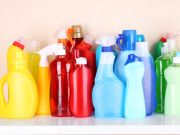- Could Your Grocery Store Meat Be Causing Recurring UTIs?
- Are You Making This Expensive Thermostat Error This Winter?
- Recognizing the Signs of Hypothyroidism
- 10 Strategies to Overcome Insomnia
- Could Artificial Sweeteners Be Aging the Brain Faster?
- Techniques for Soothing Your Nervous System
- Does the Water in Your House Smell Funny? Here’s Why
- Can a Daily Dose of Apple Cider Vinegar Actually Aid Weight Loss?
- 6 Health Beverages That Can Actually Spike Your Blood Sugar
- Treatment Options for Social Anxiety Disorder
Babies’ Exposure to Household Cleaning Products Tied to Later Asthma Risk

A key to your baby’s asthma risk may be as close as your laundry room.
Canadian research shows that an infant’s exposure to household cleaning products in the first few months of life is tied to heightened odds for asthma by age 3.
Babies may be especially vulnerable because they “typically spend 80% to 90% of their time indoors, and are especially vulnerable to chemical exposures through the lungs and skin due to their higher respiration rates and regular contact with household surfaces,” according to study lead researcher Tim Takaro. He’s a physician-scientist in the faculty of health sciences at Simon Fraser University in Burnaby, British Columbia.
In their research, Takaro’s group examined questionnaires completed by parents of more than 2,000 children who were exposed to household cleaning products from birth up to 4 months of age.
The children were assessed at 3 years of age for asthma, recurrent wheeze and “allergic sensitization.”
The study couldn’t prove cause and effect, but the researchers reported that babies with the highest levels of exposure to cleaning products had a 37% rise in their risk of being diagnosed with asthma by 3 years of age. These babies also had a 35% higher risk of developing recurrent wheezing by the same age.
The most common household cleaning products parents reported using were hand dishwashing soap, dishwasher detergent, multisurface cleaners, glass cleaners and laundry soap.
Scented and sprayed cleaning products were associated with the highest risk of wheeze and asthma, according to the study published Feb. 18 in the CMAJ (Canadian Medical Association Journal).
What’s the possible link? According to the researchers, chemicals in cleaning products may damage infants’ respiratory lining by triggering inflammatory pathways of the immune system, leading to asthma and wheeze.
Changes to an infants’ microbiome — the trillions of healthy, helpful microbes that live in the human body — may also play a role, they added.
“Most of the evidence linking asthma to the use of cleaning products comes from adults,” Takaro said in a journal news release, so the new study adds valuable information.
One expert unconnected to the new study noted that the researchers tried to account for other risk factors in their calculations.
The link between cleaning products and childhood asthma “was found in children who did not have secondhand smoke exposure, so the two exposures are not conflated,” said Dr. Len Horovitz, a pulmonary specialist at Lenox Hill Hospital in New York City. Cigarette smoke in the home is a known risk factor for asthma in kids.
Barbara Keber is vice chair of family medicine at Northwell Health in Glen Cove, N.Y. Reviewing the new study, she said it mimics “others which reveal similar findings in children over the last decade.”
Keber did point out that the study had some shortcomings: Most of the youngsters came from white, affluent homes, and it’s not clear how much time they actually spent indoors. Also, she said, it’s not feasible to do the kind of lung testing in kids that’s used in similar studies conducted with adults.
Finally, Keber said, “it is hard to know if the symptoms will persist into later childhood or adolescence and adulthood — many children outgrow their asthma symptoms.”
But in the meantime, what can parents do if they want to minimize the potential risk?
According to the Canadian team, choosing household cleaning products that aren’t sprayed or don’t contain so-called “volatile organic compounds” could help minimize children’s exposure.
For his part, Horovitz advises that “proper ventilation should be observed whenever cleaning products are used around children. Products that are free of scents, alcohol and chemicals (eco-friendly) are alternatives to harsh cleaning fluids.”
More information
The American Academy of Pediatrics has more on asthma.
Source: HealthDay
Copyright © 2026 HealthDay. All rights reserved.










